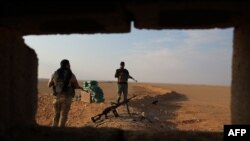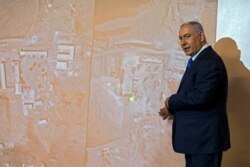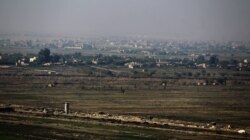A number of people were killed and wounded early Tuesday in what reported was a drone strike on an Iraqi Shi'ite militia weapons depot in the Anbar province town of Hit, Arab and Iraqi media say.
The explosion was the fourth such attack at a Shi'ite militia base since mid-summer. It was not immediately clear who was behind the attack.
Saudi-owned al Arabiya TV claimed that more than a dozen people were killed in the blast, which sent exploding rockets and missiles hurtling into surrounding areas. Video of the overnight explosion showed a massive fireball climbing into the dark sky, sending plumes of smoke and fire in different directions.
An Iraqi parliamentary investigation into several previous Shi'ite weapons depot explosions placed possible blame on poor weapons storage and high temperatures. Shi'ite militia Deputy Commander Abou al Mehdi al Mohandes has accused both the U.S. and Israel of complicity in the explosions. Assorted Arab media reports claim the militias are attempting to form their own air force.
Some Iraqi media outlets accused Israel of the attack, but VOA could not independently confirm the claim. The Tuesday attack came one day after Israel reportedly attacked a pro-Iranian Shi'ite militia base in the Syrian border town of Albukamal, killing at least a dozen people.
Israeli Prime Minister Benjamin Netanyahu said recently that Syria "will pay the price" for allowing Iran to deploy forces on its soil. Netanyahu is expected to meet with Russian President Vladimir Putin, whose forces are supporting the Syrian government with troops and weaponry, in the next few days.
Al Arabiya TV reported Tuesday the Syrian-Iraqi border crossing at Al Qaim — which faces the Syrian town Albukamal, site of yesterday's airstrikes — will remain closed, despite earlier expectations that it would reopen in the next several days. U.S.-backed forces control the second Syrian-Iraqi border crossing at al Tanf.
Middle East analyst Theodore Karasik told VOA he has "no doubt that Israel is increasing its strikes across the Levant to interrupt the flow of armaments, and especially missile parts and related technology."
"Drone wars are heating up in the region" as various sides, "including state and non-state actors," use the technology, he said, adding that Israeli drone strikes "are clearly meant to interrupt supply lines."
Hilal Khashan, who teaches political science at the American University of Beirut, also thinks Israel was behind the attack on the Shi'ite weapons depot, which he pointed out came "just after [Lebanon's] Hezbollah announced that it had shot down an Israeli drone." He does not believe the U.S. would have attacked Iran's Shi'ite allies, "since it is keen on averting reprisals."
Dr. Paul Sullivan, a professor at the National Defense University, told VOA the "increase of drone strikes" and "proxy war against Iran via its proxies in Iraq" is a way of "sending messages to Iran to back off on some of its behavior." However, he said, it is a "risky move and [Tehran's] proxies could respond in kind or even more strongly."






